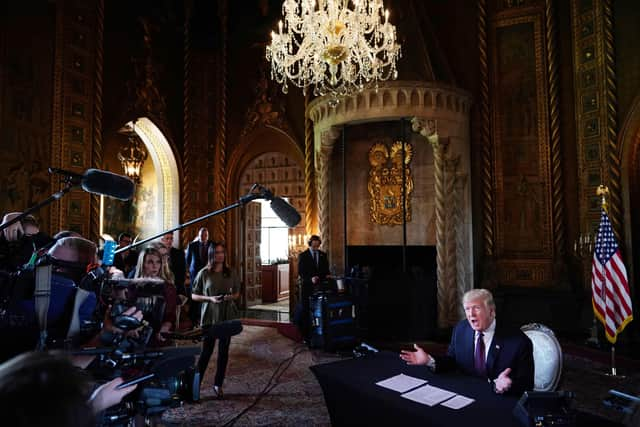High stakes FBI raid on Mar-a-Lago leaves more than Donald Trump at risk
The executive vice-president of the Trump Organisation was still adjusting to a new time zone after returning to New York from a whirlwind tour of the firm’s Scottish golf resorts in Turnberry and Balmedie, when he received a telephone call that surely roused him fully awake.
The caller informed him that some 1,200 miles south in Palm Beach, Florida, the FBI was searching Mar-a-Lago, the extravagantly decorated Mediterranean-style villa that has been his father’s primary residence since he left office. The 38 year-old quickly alerted Trump, presumably holding the telephone at arm’s length on hearing his response.
Advertisement
Hide AdAdvertisement
Hide AdWith so much as yet unknown about Monday’s events, it will take time to understand their full significance. Yet the fallout so far has been immense. They have unleashed a growing political storm that threatens to deepen bitter divisions in American society, and frame not just November’s midterms, but the 2024 White House race.
Above all else, the unprecedented escalation of the US justice department’s investigations into the former president puts to bed the notion that authorities are reluctant to hold Trump accountable to the rule of law.
What took place at Mar-a-Lago over the course of several hours has been described as a raid, but such loaded terminology obscures a key factor – the FBI entered Trump’s property with a judicially authorised search warrant.
To obtain that warrant, the agency had to obtain the approval of a federal judge, who decided the application met the required legal grounds of probable cause that evidence of a crime would be found. This was no fishing expedition.
It is not clear what that evidence was, nor what crimes are suspected, although the search is believed to centre around Trump's handling and retention of classified White House records after he left office. The contents of those records, who might have access to them, and the repercussions of their potential misuse, remain mysteries. Similarly, we do not know if Trump had declassified any sensitive information prior to leaving the White House; such a power extends only to incumbent presidents.


What we do know is Trump has previous when it comes to his record keeping. The US National Archives, the government agency tasked with collecting and sorting presidential material, has previously said at least 15 boxes of White House records were recovered from Mar-a-Lago resort, including some that were classified.
Earlier in the summer, investigators from the US justice department visited the property, often used by Trump as his de-facto seat of power during his presidency, in search of further information about potentially classified material. Christina Bobb, a lawyer for Trump, said the 76 year-old and his legal team had co-operated with the justice department and the FBI “every step of the way.”
That claim sits uneasily with the FBI’s decision to successfully obtain a search warrant, generally seen as a last resort for obtaining evidence after all other avenues, such as subpoenas, have been exhausted or deemed futile.
Advertisement
Hide AdAdvertisement
Hide AdIt does not automatically follow the search warrant will precede an indictment, though many wonder whether, in the event of a successful prosecution, Trump could be barred from standing from office. On the face of it, the law in question – section 2071, title 18, of the United States code, which defines the crime of someone wilfully and unlawfully concealing, removing, mutilating, obliterating, falsifying, or destroying government documents – carries a maximum prison sentence of three years.
Even more significantly, it also disqualifies the guilty party from holding public office. However, that statute cannot ride roughshod over the US constitution, which sets out the exclusive eligibility criteria for the presidency. There is an argument no matter what, a guilty verdict would be politically devastating for Trump. Yet its weight depends entirely on your political outlook, and a case for the counterargument can – and is – being made.
Indeed, there are no straightforward answers to the question of how all this will impact Trump's political future. He has long portrayed himself as both a saviour and a martyr. If, as is widely expected, he runs in 2024, his campaign will double down on talking points depicting him as a president wrongfully deposed by sinister forces.
There was more than a flavour of this in the rambling attack Trump issued minutes after a local reporter in Florida broke the news of the FBI’s activities. In a statement, he described it as “an attack by radical left Democrats” and an “assault” befitting a third world country. “They are trying to stop me, and the Republican Party, once more,” Trump added.
It did not take long for Trump loyalists to put flesh on the bones of his hastily sketched out conspiracy. Many sought to contextualise the FBI search as part of a deep state plot to halt Trump’s candidacy via a partisan justice system. Some have demanded the FBI, helmed by Christopher Wray, a Trump appointee, be defunded.
One prominent talk radio host characterised the search as a “pre-emptive coup”. Others went further. Steven Crowder, a conservative commentator previously suspended from YouTube for violating its policies, tweeted late Monday night: “Tomorrow is war. Sleep well.”
No doubt all of this will have weighed heavily on the minds of the FBI. Its decision to proceed with its operation risks inflaming tensions, regardless of whether Trump is charged. Equally, were it to have shied away from investigating for fear of the same outcome, it would have grossly undermined the rule of law and dealt a fatal blow to an already fragile institutional trust.
The FBI has met a legal standard to reach this point, but it has also overcome an even higher political threshold. How it all plays out is anyone’s guess. The stakes are high, both for Trump and the country he hopes to lead once again.
Comments
Want to join the conversation? Please or to comment on this article.
